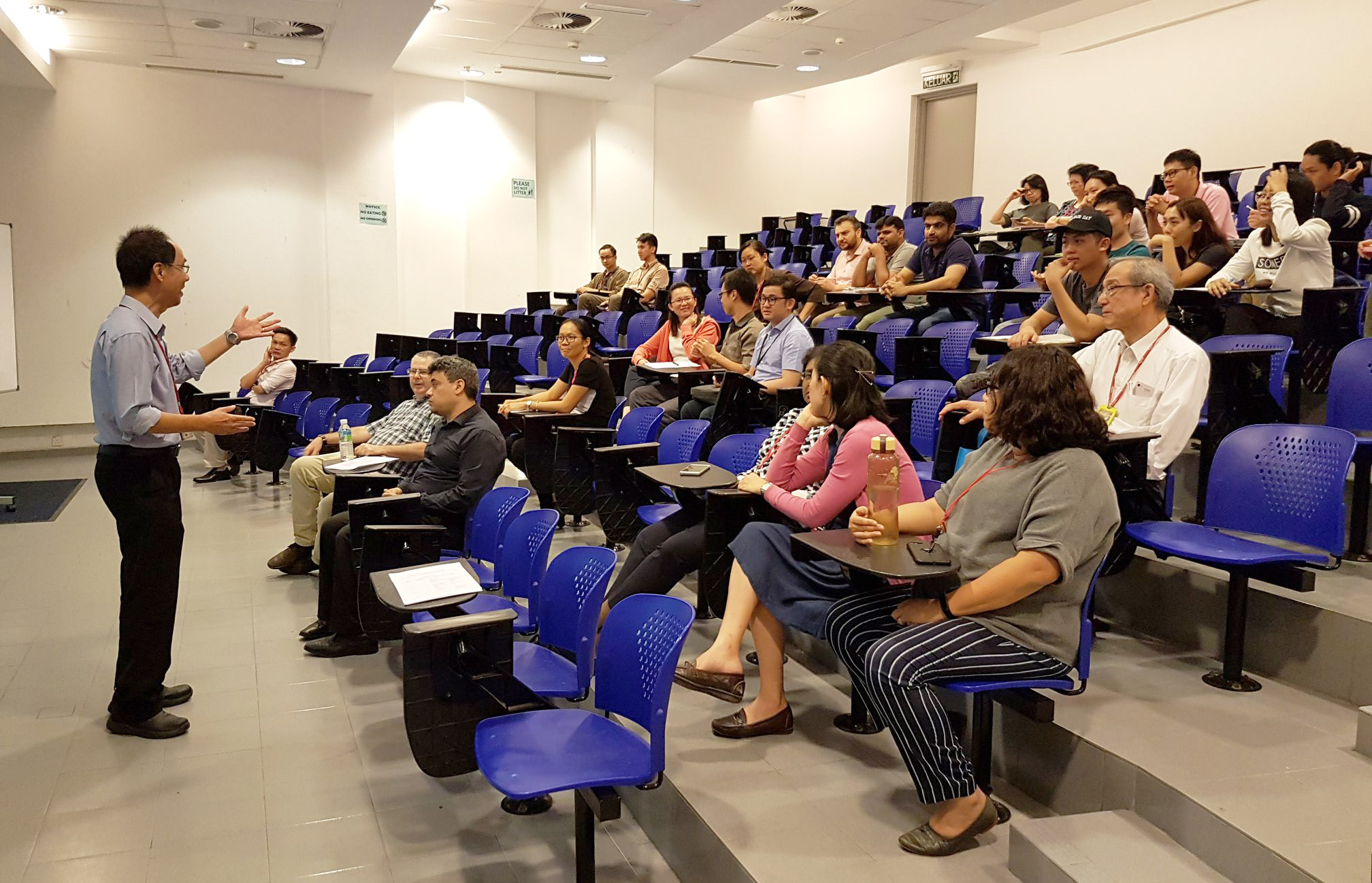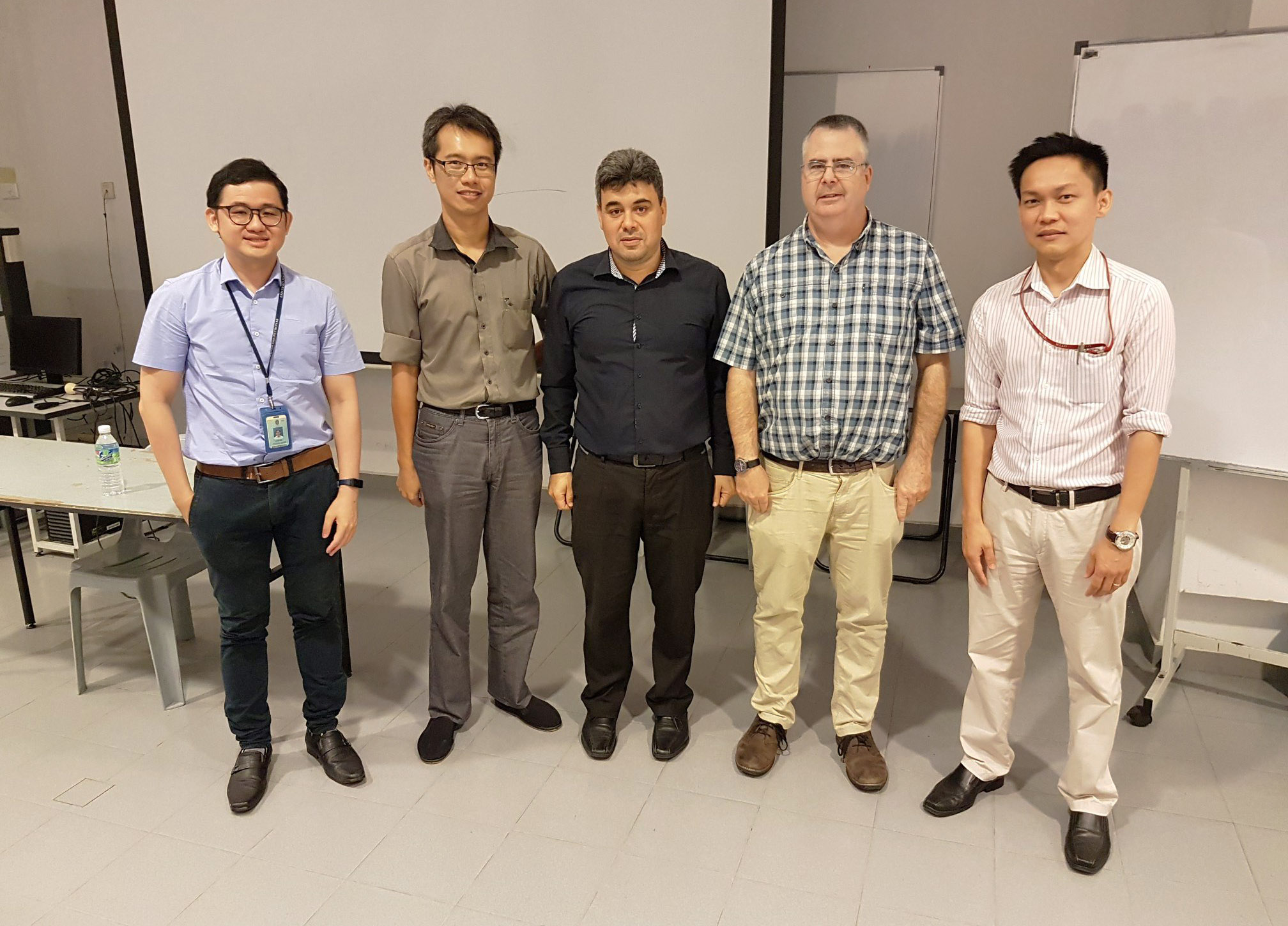

The UTAR Mini Symposium on Chemistry and Green Energy was held at Kampar Campus on 10 January 2019. It saw the active participation of undergraduate and postgraduate students from UTAR and other public and private universities in Malaysia.
The successful mini symposium was organised by UTAR Faculty of Engineering and Green Technology (FEGT) and saw a total of four knowledgeable presenters comprising academics and scholars from institutions of higher learning, both locally and internationally, assembling at Kampar Campus for presentations of their research findings and research experiences in chemistry and green energy fields.

Dr Yap delivering his welcome address
to speakers and participants
Invited to officiate the symposium was Dean of FEGT Assoc Prof Dr Yap Vooi Voon. In his opening remarks, Dr Yap expressed his gratitude to the speakers and participants for their support and participation. He explained, “The symposium aims to provide an opportunity to both undergraduate and postgraduate students as well as academics to discuss and share knowledge about their research. The symposium also aims to create a platform for students to interact with experts from the academic sector.”
He added, “It is a great meeting place for developing the research experience of young researchers.The involvement of students in symposiums and seminars will give good exposure to them and hopefully instil the interest to further their research.” Dr Yap also congratulated the organising committee for making the symposium possible.
Also present at the symposium were the Organising Chairperson of the Mini Symposium on Chemistry and Green Energy Assoc Prof Dr Mohammed J. K. Bashir, organising committees, FEGT academics, UTAR staff and students.

Dr Bashir (middle) with distinguished speakers (from left) Dr Lam, Dr Lim, Dr Lawrence and Dr Tan
The symposium started with the first speaker, Assoc Prof Dr Lawrence Pratt from The City University of New York, USA. He delivered a talk titled “Hydrocarbon and Biodiesel Fuels from Brown Grease: Progress Toward an Industrial Process”. In his talk, he explained, “Bio grease is a nuisance found in sewer pipes and wastewater treatment facilities. Through research we have found that brown grease can be thermally converted to a mixture of hydrocarbons and the product distribution depends on the reaction conditions. This conversion takes place mainly via known reactions and the heating profile has a large influence on the distribution of hydrocarbons and byproducts in the product stream.”
The second speaker of the symposium was UTAR FEGT’s Deputy Dean for Student Development and Industrial Training Dr Tan Kok Tat who delivered a research talk titled “Green Energy from Sustainable Resources”. He elucidated, “The quest for green energy has been extensively researched throughout the world to replace fossil fuels as the main energy source. Biodiesel has emerged as the most suitable choice to be the main renewable energy source but due to issues related to edible oils such as feedstock, the attention has been shifted to non-edible oils. However, the conventional method of employing alcohol as acyl acceptor in trans-esterification does not address the issue of cost-effectiveness of the process. Therefore, it is crucial to solve this problem with the employment of alternative solvent as acyl acceptor that is cost-effective and environmentally friendly.”
The symposium proceeded with the third speaker from the Department of Applied Science of Universiti Teknologi Petronas (UTP) Dr Lim Jun Wei. His talk was focused on “BIOconversion to BIOremediate” and he described, “The rise in world population has inevitably led to the humongous generations of both solid and liquid wastes. The indiscriminate discharge of these wastes into the natural environments will definitely engender various complications, menacing the adjacent living organisms including humans. The impacts can also reverberate further if the wastes are toxic or/and released incessantly. In this regard, numerous physical and chemical approaches have been adopted to treat or at least reduce the daily generated wastes. However, in ensuring the natural sustainability, the biological means are conventionally preferred to bio-convert the wastes into innocuous substances that are more acceptable by the environment upon the discharge. Best if some valuable biochemical compounds can be ultimately harvested amidst the bioconversion in bioremediating the solid and liquid wastes.”
Last but not least, the symposium concluded with a talk titled “Semi-continuous Cultivation of Chlorella vulgaris by Using Compost as Nutrients Source for Biomass and Lipid Production”. The talk was delivered by a lecturer from the Department of Chemical Engineering of UTP Dr Lam Man Kee. He explained, “In the present study, cultivation of Chlorella vulgaris was extensively explored under semi-continuous approach to enhance its growth. The microalgae were cultivated with compost derived from chicken waste as an alternative nutrients source in both batch and semi-continuous cultivations. It was found that Chlorella vulgaris grew well up to 17 cycles of semi-continuous cultivation based on the following conditions for each cycle (three days per cycle): 30% (v/v) removal of cultivation medium and 0.04 L/L of chicken compost in cultivation medium of pH three. The average biomass productivity attained through these conditions was 0.0736 g/L/day, which was higher than batch cultivation (0.0568 g/L/day). Besides, the average total lipid content from each cycle under semi-continuous cultivation was maintained in the range of 25–35 wt%. The fatty acid methyl ester (FAME) compositions of Chlorella vulgaris consisted mainly of C16:0 and C18:3 that were not significantly altered during the semi-continuous cultivation.”
The mini symposium ended with an in-depth discussion session and a group photograph of all speakers, participants and organisers.
© 2019 UNIVERSITI TUNKU ABDUL RAHMAN DU012(A).
Wholly owned by UTAR Education Foundation Co. No. 578227-M LEGAL STATEMENT TERM OF USAGE PRIVACY NOTICE